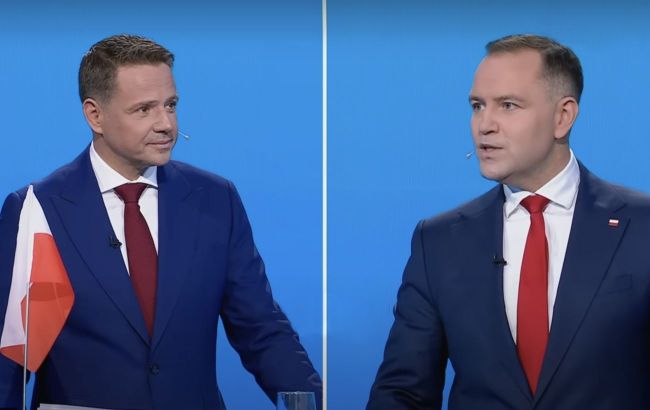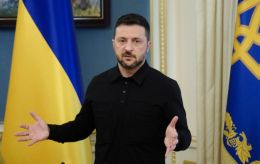Presidential race in Poland: Ukraine, drug scandals and leading candidate
 Rafał Trzaskowski and Karol Nawrocki at the debate (photo: Getty Images)
Rafał Trzaskowski and Karol Nawrocki at the debate (photo: Getty Images)
Poland is in the midst of preparations for the second round of the presidential election, which will take place on Sunday, June 1. The two main candidates - Rafał Trzaskowski and Karol Nawrocki - are mobilizing their voters and fiercely competing for the far-right electorate.
RBC-Ukraine outlines the key developments and scandals of recent days, as well as Ukraine’s role in the campaign.
In the first round, Karol Nawrocki, the right-wing conservative head of the Institute of National Remembrance, secured slightly more votes than predicted by polls - 29.5%. His opponent, Rafał Trzaskowski, the liberal-left mayor of Warsaw, underperformed somewhat, receiving a forecasted 31.4%.
The election is taking place amid deep polarization in Polish society. It means that other candidates can be categorized into two opposing camps, represented by Trzaskowski and Nawrocki. As a result, their votes are currently splitting almost evenly. According to an IBRiS poll conducted for Polish Radio on May 25, Nawrocki had the support of 44.9% of voters, while Trzaskowski was slightly ahead with 45.7%.
Since the gap between the candidates is much smaller than the statistical error, the battle even for fractions of a percent continues.
Face-to-face meeting of the frontrunners
The climax - but not the conclusion - of the confrontation between the two candidates came during the debate held on Saturday, June 24. The debate covered a wide range of topics, from healthcare and migration to foreign policy and support for Ukraine.
Trzaskowski leaned on his successes as mayor of the capital and demonstrated that he understood many areas of public policy. Nawrocki, in contrast, focused on criticizing Trzaskowski's work and emphasized his image as a man outside of politics.
Both politicians expressed similar positions on supporting Ukraine. Nawrocki stated during the debate that he backs military aid to Ukraine, as it is an effective way to deter Russian aggression. Trzaskowski said Poland should protect its own economic interests, but also called for continued military support for Ukraine.
"Rafał Trzaskowski appeared more confident. As for Karol Nawrocki, he held his ground overall, but he resorted to harsher rhetoric and tried to belittle Trzaskowski. Still, it was clear he was less knowledgeable and less prepared than the current mayor of Warsaw. I believe Trzaskowski managed to persuade some voters," said Stanisław Zhelichowski, a political science PhD and foreign policy expert, in comments to RBC-Ukraine.
For Nawrocki, the debate was marked by another scandal. During the live broadcast, he put something in his mouth while covering it with his hand, then rubbed his nose and drank some water. After the debate, a journalist asked what he had taken, to which Nawrocki replied, "It was chewing gum."
However, speculation began to spread on social media that it could have been drugs. After the scandal, Nawrocki’s campaign chief, Paweł Szefernaker, issued a clarification, stating that Nawrocki had used snus (a form of smokeless tobacco) "to stay alert during Trzaskowski's long speeches."
However, this story is more important for Trzaskowski's supporters as another reason for jokes. Nawrocki's voters paid little attention to the episode, especially after he seized the narrative by publicly challenging Trzaskowski to take a joint drug test, which the latter declined. For a time, the snus incident dominated Polish media sympathetic to Trzaskowski, displacing other topics.
Fight for the far-right
Some of the candidates who did not make it to the second round have already declared their positions. As expected, Trzaskowski was predictably supported by left-wing politician Magdalena Biejat (4.23% in the first round) and Sejm Speaker Szymon Hołownia (4.99%). Both took part in a large-scale march in support of Trzaskowski that took place in Warsaw this Sunday. Polish Prime Minister Donald Tusk, several ministers, as well as Romania’s new president, Nicușor Dan, who recently won the elections, also joined the march. According to Warsaw’s municipal services, around 140,000 people gathered.
Karol Nawrocki also held his own march at the same time on the same day, but it was smaller in scale, with 50,000 participants, and was supported only by representatives of the opposition Law and Justice party, led by Jarosław Kaczyński.
At the same time, the candidate who came in third with 14.8% - far-right politician Sławomir Mentzen - has not yet announced his position. Aware of the weight of his electorate, he invited both candidates to his YouTube channel and essentially announced an auction - who could offer more to his voters.
Mentzen sent an eight-point declaration to Nawrocki and Trzaskowski. According to him, his supporters would be able to decide their stance in the second round based on this document. Among other things, the declaration includes points rejecting the introduction of new taxes, protecting freedom of speech, and opposing the deployment of Polish soldiers to Ukraine and Ukraine’s accession to NATO.
Nawrocki quickly signed the document, including the points potentially harmful to Ukraine. Trzaskowski, on the other hand, refused to sign it, although he met with Mentzen informally over a beer in a pub. The main reason for his refusal was the clause opposing Ukraine's NATO membership.
Nevertheless, Mentzen has not yet declared his position on the second round. He is expected to make an official announcement on Wednesday, May 28.
"It’s very doubtful that Mentzen will support Trzaskowski, but he may say that citizens should decide for themselves who to vote for. This has happened before. But his voters could be decisive," Zhelichowski said.
Thus, the intrigue in the Polish election remains. Among other things, the task for both candidates is to mobilize their supporters as much as possible so that they come to vote.
At the same time, the decisive role could be played not only by voters inside Poland but also by the diaspora. And here, too, there are interesting developments. According to Zhelichowski, the number of Poles registering to vote abroad is increasing, and there, Trzaskowski’s supporters dominate.
However, a week of active campaigning still lies ahead, during which both candidates will have the chance to play all their trump cards, provoke new scandals, and, of course, speculate on the Ukrainian issue.
RBC-Ukraine previously explained why this year's presidential election is important for Poland and which of the candidates could be more constructive in relations with Ukraine.

